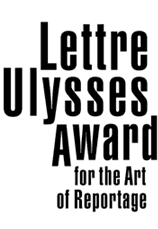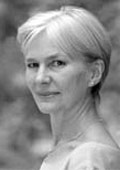
Isabel Hilton, Great Britain
 “There is no objective text. However, there are degrees of attention given to personal response and personal feeling, and I think reportage should err on the side of the more objective. So it’s not memoir, it’s not autobiography, it’s not internal journey.”
“There is no objective text. However, there are degrees of attention given to personal response and personal feeling, and I think reportage should err on the side of the more objective. So it’s not memoir, it’s not autobiography, it’s not internal journey.”
Writer, journalist, reporter, commentator, radio broadcaster. Isabel Hilton was born in Aberdeen, Scotland. From 1973 to 1975, she studied Sinology at the University of Edinburgh and continued her education at the Peking Languages Institute and the Fudan University in Shanghai. She is an expert in Chinese affairs.
In 1977 she joined the Sunday Times as a feature writer and her subsequent posts at that paper included those of reporter, special correspondent for China, Latin America Editor and Assistant Foreign Editor. Her foreign assignments took her to the United States, France, Spain, the Middle East, Japan, China, Hong Kong, and Africa. In 1986, Isabel Hilton joined The Independent newspaper, pre-launch, as its Latin America Editor and from 1989 she served as the European Affairs Editor, covering the end of the Cold War, and the subsequent elections in Central and Eastern Europe. She also oversaw coverage of Western Europe, including the European Community, in the run up to 1992. She left The Independent in 1995 to write a book about China and Tibet.
Isabel Hilton presented BBC Radio 4's The World Tonight from 1995 to 1998 and in 1999 she joined Radio 3's Night Waves as a presenter. Her radio documentaries for the BBC include: Petra and the General, an investigation of the life and death of Petra Kelly (1994); Kingdom of the Lost Boy, an account of the search for the 11th Panchen Lama (1996); City on the Edge, a documentary about economic reforms in China (1998); Condemned to Live, a report about the after-effects of mass rape and genocide in Rwanda (1999), and The Caravan of Death, about the case against Pinochet. She has also worked on documentaries about right-wing extremists in Germany and bio-piracy in Ecuador.
Isabel Hilton wrote The Search for the Panchen Lama in 1999. She co-authored The Falklands War (1982); The Fourth Reich: Klaus Barbie and the Neo-Fascist Connection (1984); and contributed to Betrayed, Abuses of the Rights of the Child (1986). Her work has been included in The Best of Granta Travel (1990) and The Best American Travel Writing (1999). Hilton is the only reporter ever to have interviewed the world’s longest-reining military dictator, General Alfredo Stroessner, and this is also included in a Granta collection. She contributes regularly to various publications, including the New Yorker, New Statesman, Time, New York Times Magazine, Literary Review, Financial Times, The Independent, The Observer, The Guardian, The Economist and Lettre International.
Hilton is a renowned lecturer on international relations. She is a member of the Royal Institute of International Affairs and has a seat on the editorial board of International Affairs. She is also a member of the British Association of China Scholars and is part of the advisory committee of the Latin America Bureau. She was awarded an honorary doctorate from the University of Bradford in 2003. Hilton is also the editor of the openDemocracy.net website, an independent news source that is based on exchange and participation, with readers and contributors from around the world.
In 2005, Hilton published an article in Granta about the working conditions in China which facilitate the country’s explosive economic growth, and the price of these, in environmental, social and health terms. She is currently working on a book of collected reportage, including writing from Pakistan, Afghanistan, Tibet, India, and the Middle East.
Isabel Hilton is fluent Chinese, Spanish, French and German. She lives with her family in London.
